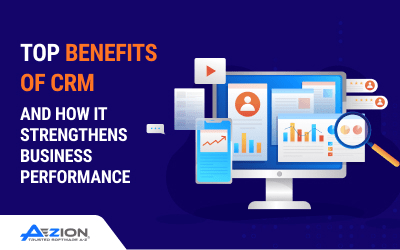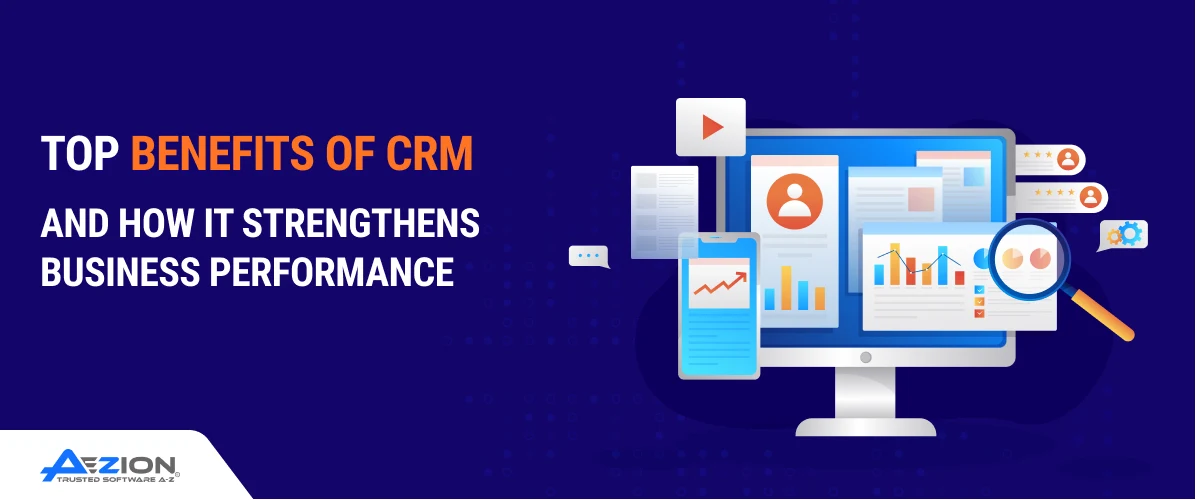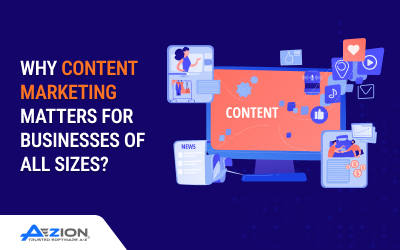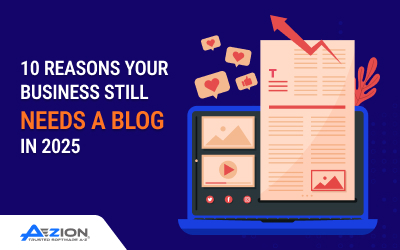Summary
CRM platforms give businesses a structured approach to managing customer data, sales processes, and engagement strategies. This blog explores the key benefits of CRM, covering how modern systems improve collaboration, increase retention, drive personalized outreach, and support informed decisions across sales, marketing, support, and leadership functions.
Introduction
CRM platforms have become essential business infrastructures prioritizing growth, retention, and operational precision. The CRM benefits extend far beyond contact storage. From driving informed sales decisions to enabling strategic marketing execution, CRM systems support scalable, customer-centric operations built on accurate, accessible, and actionable data.
What is CRM and Why Does It Matter?
Customer Relationship Management (CRM) is a software system that centralizes customer interactions, tracks sales activity, and aligns business functions. It connects sales, marketing, and support teams through shared access to customer data, helping reduce fragmentation and support customer-centric decisions across all stages of engagement. The reasons why CRM is important for businesses to stay ahead include:
- Aligns internal teams with unified customer records
- Tracks customer behavior to improve retention and sales
- Identifies valuable leads and improves deal conversions
- Replaces manual tasks with automated workflows
- Supports long-term loyalty with personalized communication
Key Benefits of CRM For Businesses
CRM platforms improve operational focus and strengthen customer engagement across departments. Below are core business functions that gain measurable value from a well-implemented CRM system.
Centralized Customer Data
CRM systems store contact details, communication logs, and purchase history in one structured platform. This eliminates scattered records, improves data accuracy, and ensures every team works with complete, consistent customer information in real-time.
Improved Customer Retention
CRM platforms monitor customer interactions, preferences, and service history to identify churn risks. Timely follow-ups, personalized offers, and automated reminders help businesses retain customers through better communication and proactive relationship management.
Enhanced Sales Productivity
Sales teams manage leads, pipelines, and deals using CRM tools. With better tracking and activity monitoring, sales cycles become shorter, opportunities are prioritized efficiently, and team performance becomes easier to evaluate and refine.
Streamlines Communication Across Teams
A CRM gives all departments access to unified customer records. Marketing, sales, and support teams work from the same data, which minimizes miscommunication and builds a consistent customer experience across every stage.
Better Customer Segmentation and Targeting
CRM platforms allow businesses to segment leads based on behavior, location, and buying patterns. This supports more precise targeting, innovative campaign planning, and higher-quality engagement through customized outreach efforts.
Accurate Sales Forecasting
CRM software uses pipeline visibility, deal status, and historical trends to project future sales performance. This improves forecasting accuracy and supports better decision-making around budgeting, staffing, and revenue goals.
Data-Driven Decision Making
CRM tools aggregate customer insights, sales results, and campaign performance data. Decision-makers access reliable metrics that guide planning, refine tactics, and align day-to-day operations with broader business objectives.
Personalized Marketing Campaigns
Marketers use CRM data to deliver messages tailored to customer interests, behavior, and history. This personalization improves open rates, conversion metrics, and long-term brand engagement across email and digital channels.
Efficient Customer Support
Support agents view customer histories, including past issues, product use, and feedback. This enables faster resolutions, improves customer satisfaction, and builds trust by making each interaction more informed and consistent.
Increased Collaboration and Workflow Automation
CRMs automate repetitive activities like follow-ups, lead assignments, and alerts. This reduces delays, increases team coordination, and frees up time for higher-value work across customer-facing and internal functions.
Industry-Specific CRM Benefits
CRM platforms adapt to industry workflows, improving visibility, communication, and operational outcomes. The following sectors demonstrate how structured CRM usage transforms engagement and supports better decisions aligned with sector-specific priorities.
Healthcare
CRM tools in healthcare manage patient interactions, appointment schedules, and follow-up workflows. Centralized records improve care coordination, reduce administrative friction, and support timely outreach while maintaining compliance with privacy and medical data regulations.
Construction
Construction firms use CRMs to track project bids, client interactions, and subcontractor communications. It improves coordination across field and office teams, manages job timelines, and supports better forecasting of labor, materials, and revenue pipelines.
Retail
Retail businesses use CRMs to personalize promotions, track purchase behavior, and manage loyalty programs. Centralized customer data supports smarter merchandising, targeted re-engagement, and a consistent experience across online, mobile, and physical store interactions.
Manufacturing
Manufacturers use CRMs to manage distributor relationships, monitor order cycles, and handle post-sale service requests. This creates greater visibility across supply chains, improves client servicing timelines, and supports demand forecasting and product planning.
Finance
Financial firms apply CRMs to manage client portfolios, advisory sessions, and communications. It ensures accurate recordkeeping, supports tailored financial planning, and improves retention by offering timely, relevant engagement based on each client’s needs.
Common Challenges CRM Solve
CRM systems address core data access, lead tracking, and customer engagement inefficiencies. Below are common challenges they solve, each presented with precision to reflect practical impact and industry relevance.
Eliminates Data Silos
CRM platforms unify customer information across sales, marketing, and support. This eliminates scattered spreadsheets and disconnected tools, offering teams a single source of truth that supports faster decisions and consistent customer experiences across departments.
Reduces Lead Leakage
Missed follow-ups often result in lost revenue. CRM systems track every lead interaction, assign ownership, and set automated reminders—ensuring no qualified opportunity is overlooked or delayed across the sales lifecycle.
Replaces Manual Processes
Manual data entry, tracking, and reporting waste time and reduce accuracy. CRM tools automate daily tasks, organize customer records, and streamline workflows, allowing teams to focus more on selling and less on administration.
Improves Accountability
CRMs log all activities across users, including notes, calls, and deal updates. This creates complete visibility into team actions, strengthens individual accountability, and gives managers data to measure progress and address gaps early.
Enhances Visibility
CRM dashboards provide real-time views of sales performance, campaign results, and customer activity. These insights support quicker decisions, help adjust strategies, and align execution with business goals and customer expectations.
How to Maximize the Value of a CRM
To fully realize the benefits of a CRM system, businesses must go beyond basic implementation and focus on strategic usage. Whether you’re a startup or an enterprise, unlocking the full CRM benefits requires alignment between people, processes, and technology. Here’s how to maximize the return on your CRM investment:
Align CRM Strategy With Business Goals
Start by mapping CRM features to your core business objectives. Whether improving customer retention, increasing sales, or streamlining service workflows, aligning your CRM usage with measurable goals ensures you’re effectively leveraging the benefits of CRM software.
Ensure Clean, Centralized Data
A CRM is only as powerful as the data it holds. Standardize data entry, eliminate duplicates, and integrate all customer touchpoints. Clean, centralized data enhances reporting accuracy and amplifies the CRM features and benefits across departments.
Train Teams for Adoption and Efficiency
User adoption is critical. Provide role-specific training and ongoing support to ensure teams understand how to use the CRM efficiently. This drives higher engagement and helps unlock the full benefits of CRM systems across sales, marketing, and support.
Automate and Personalize Customer Journeys
Use automation tools to streamline repetitive tasks like follow-ups, lead nurturing, and onboarding. Personalization features help deliver tailored experiences, one of the most impactful CRM benefits for customer satisfaction and loyalty.
Leverage Analytics for Smarter Decisions
Modern CRMs offer dashboards and predictive analytics. Use these insights to track KPIs, forecast sales, and identify trends. This data-driven approach is a key CRM benefit that supports smarter, faster decision-making.
Customize for Your Industry and Scale
Tailor your CRM to your industry’s workflows—whether you’re in healthcare, retail, or construction. For growing companies, the benefits of CRM for small businesses include scalability, cost-efficiency, and improved customer lifecycle management.
Monitor ROI and Evolve Usage
Track CRM usage metrics and business outcomes regularly. Use this data to refine processes and expand functionality. This continuous improvement mindset ensures long-term value and reinforces the benefits of a CRM tool.
Conclusion
The benefits of CRM extend across sales, marketing, and support functions by unifying data, automating tasks, and improving decision-making. A strategic CRM implementation supports long-term business growth, strengthens customer relationships, and equips teams with the tools and insights to deliver consistent, value-driven engagement at every touchpoint. As a business owner, if you wish to leverage the CRM benefits within your processes, contact a leading Custom Software Development Company to help you gain insights on the right approach and help you implement an efficient CRM system that drives results.
FAQs
What is the main benefit of CRM for small businesses?
It helps small businesses organize contacts, track interactions, and follow up consistently. This improves customer retention, strengthens sales processes, and provides better visibility into business performance without requiring large teams or complex tools.
How does CRM improve customer service?
CRM systems give support teams access to complete customer histories, previous issues, and preferences. This helps resolve queries faster, deliver personalized service, and maintain consistency across all channels and team members.
Can CRM help with lead generation and sales tracking?
Yes, CRM tools capture lead data, track engagement, and monitor pipeline activity. This allows teams to prioritize prospects, improve conversions, and manage every sales stage with clear visibility and automated follow-ups.
Is CRM useful for non-sales teams like support or marketing?
Absolutely. Marketing teams use it for campaign targeting and segmentation, while support teams manage service tickets and track communication history. CRM helps non-sales functions collaborate more effectively using shared customer data.
What features should I look for in a CRM platform?
Key features include contact management, activity tracking, automation, reporting, integrations, and role-based access. Choose a CRM that fits your workflow, scales with your business, and supports collaboration across all departments.




